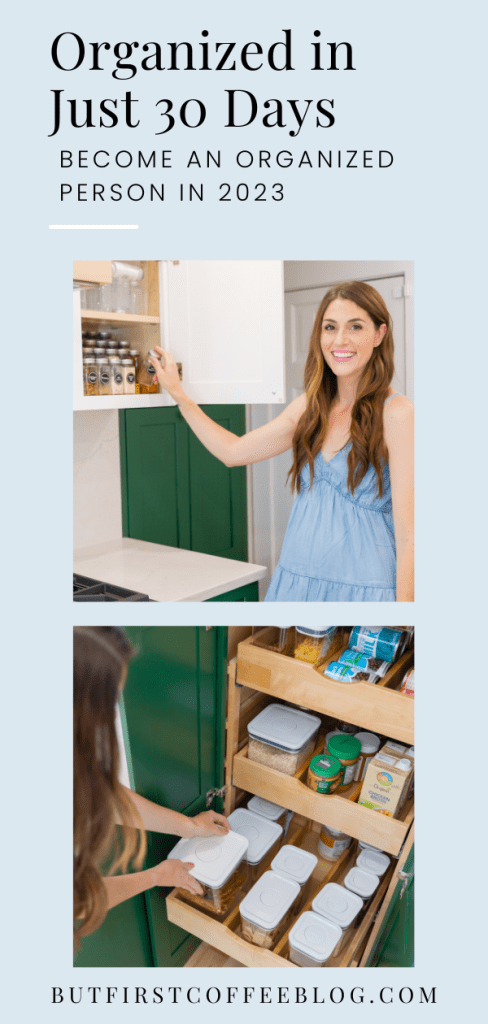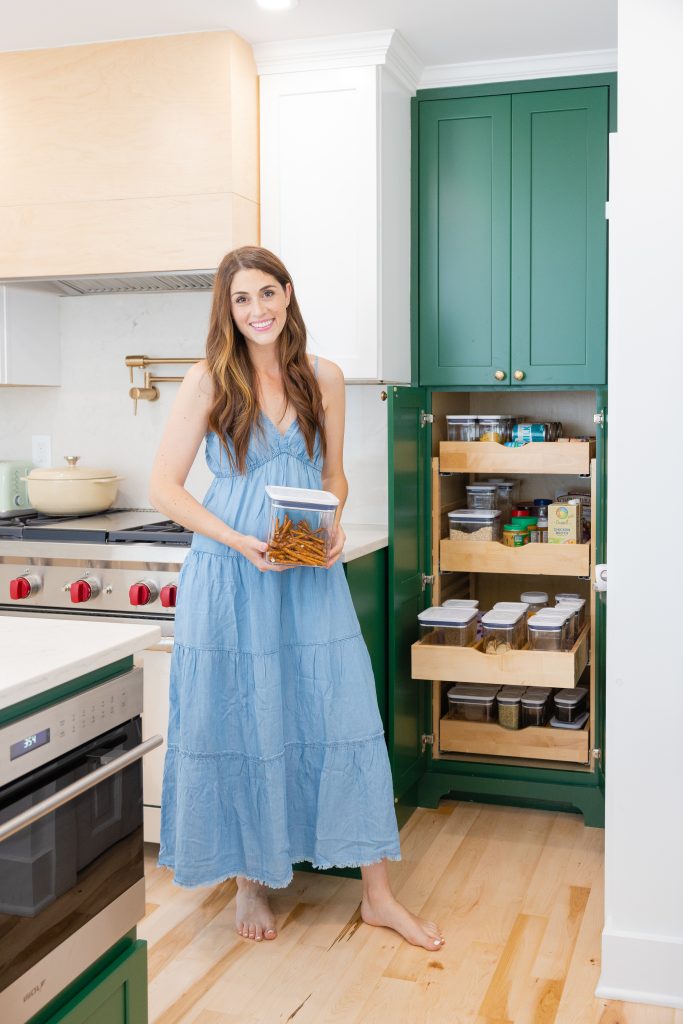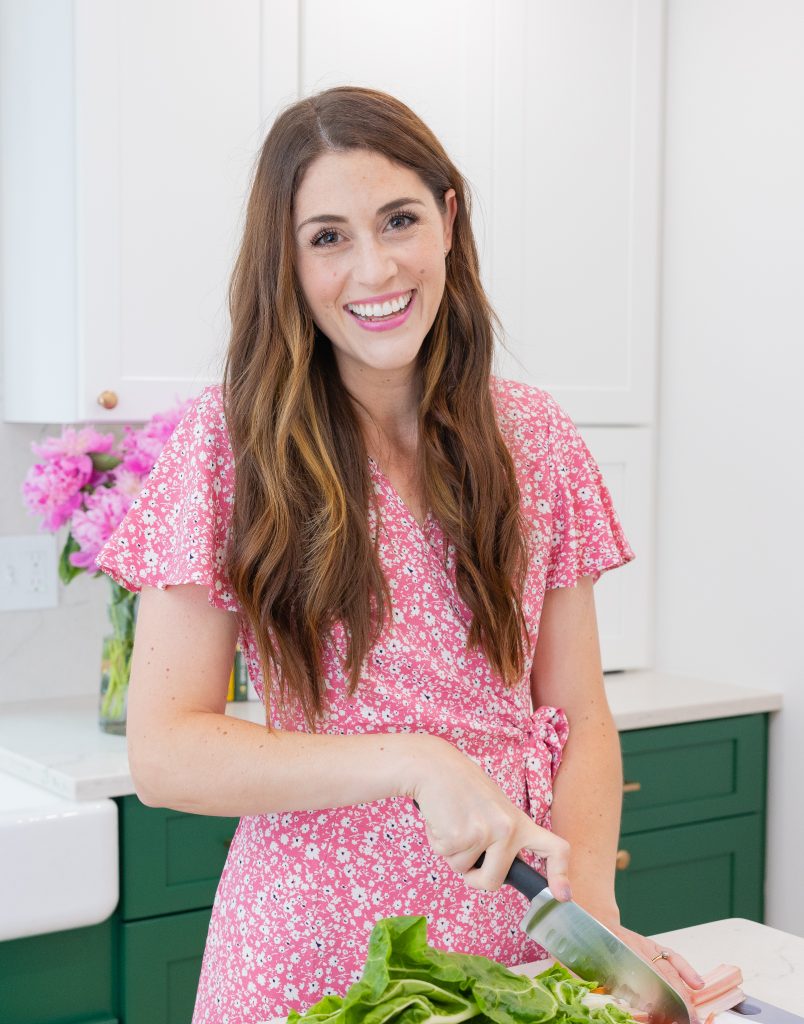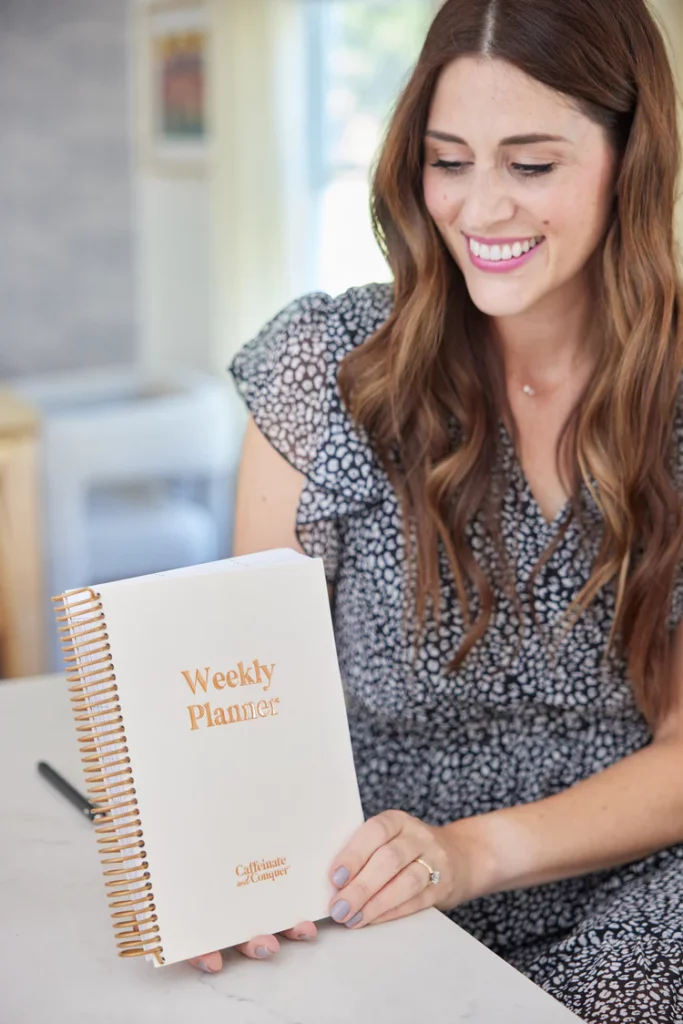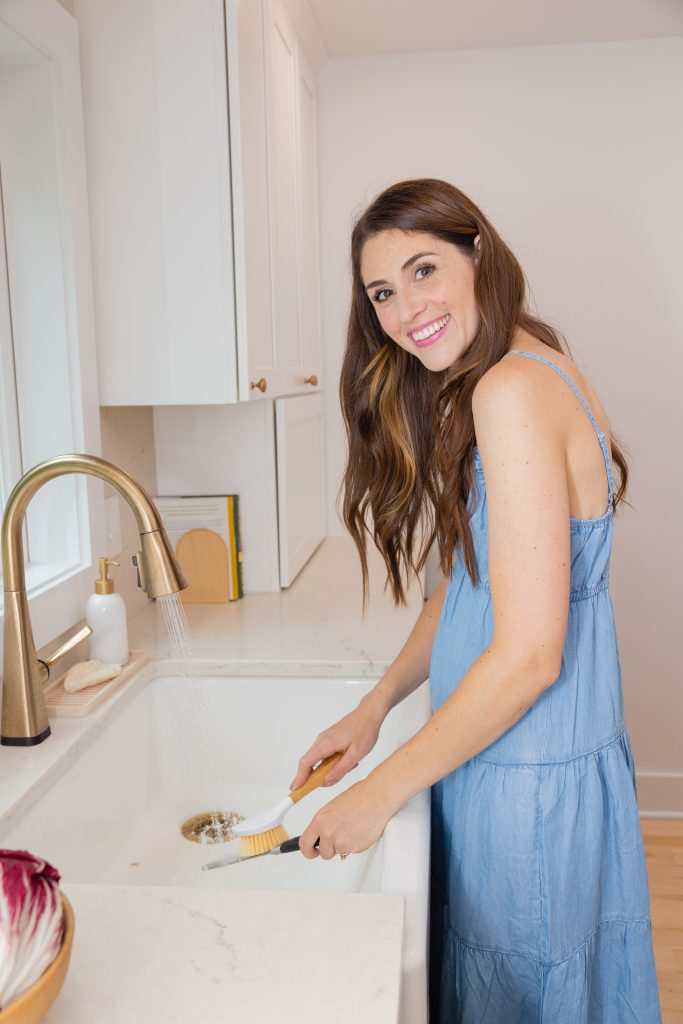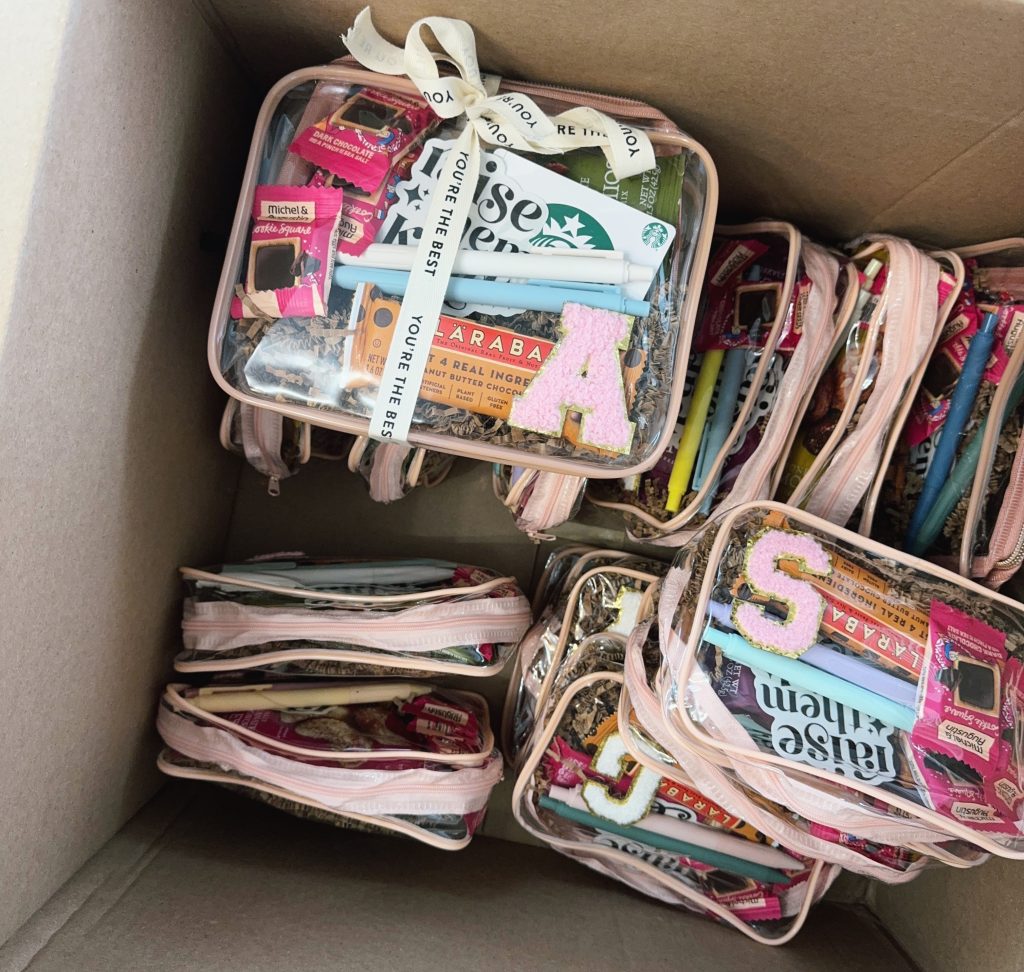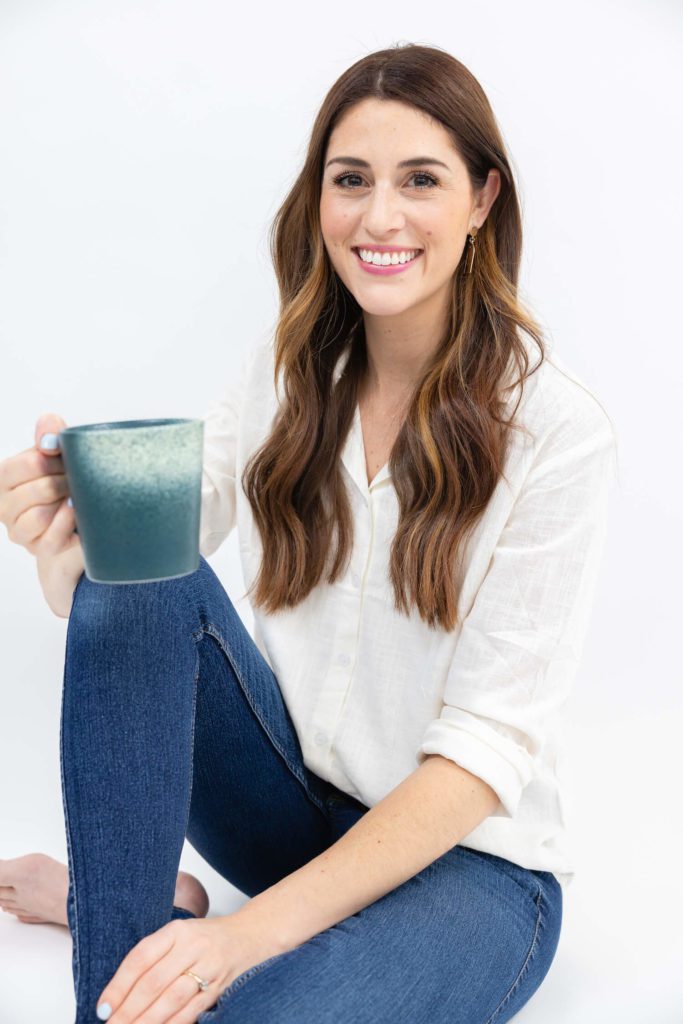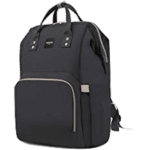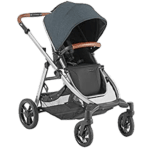If I’ve learned anything about keeping and maintaining an organized home, it comes down to the adoption of daily habits over anything else. All the decluttering and fancy labeled bins and structures won’t really matter if you haven’t committed to maintaining them. Without daily maintenance, even the best organizational structures fall apart. So, if you’re hoping to not just get more organized in 2023 but actually stay organized, read on.
In this post, we’re going to talk less about how to declutter and organize a space properly, and more about a system to follow for 30 days that will help you begin to establish and adopt the daily habits you need to keep your home organized. Now, the truth is, you can’t just become someone who is organized in 30 days, because becoming organized isn’t something you become…it’s something you do through repeated actions day after day. Just like when you start a workout regime, you have to start, and slowly over time, you’ll grow your muscles and stamina. If one day you stop exercising, eventually over time, you’ll lose your muscle and stamina. Organization in a home is the same thing. I’m sure we’ve all had that one time you spend decluttering and cleaning and organizing all day, but then a few months later it’s a mess again. That’s because getting organized is not a one-time event. It’s a daily practice. And hopefully, this 30-day challenge will help you jumpstart that practice.
Earlier this year, I shared a video called Cleaner in 30 Days: How Anyone Can Learn to Become Tidy, and we’re going to follow that same outline. We’re looking at five mantras that you’ll follow for 30 days. And, if you adopt them for 30 days, I promise that you’re going to notice not only a more organized home but that you’ll have started keeping it more organized, automatically.
Mantra One: We are what we repeatedly do.
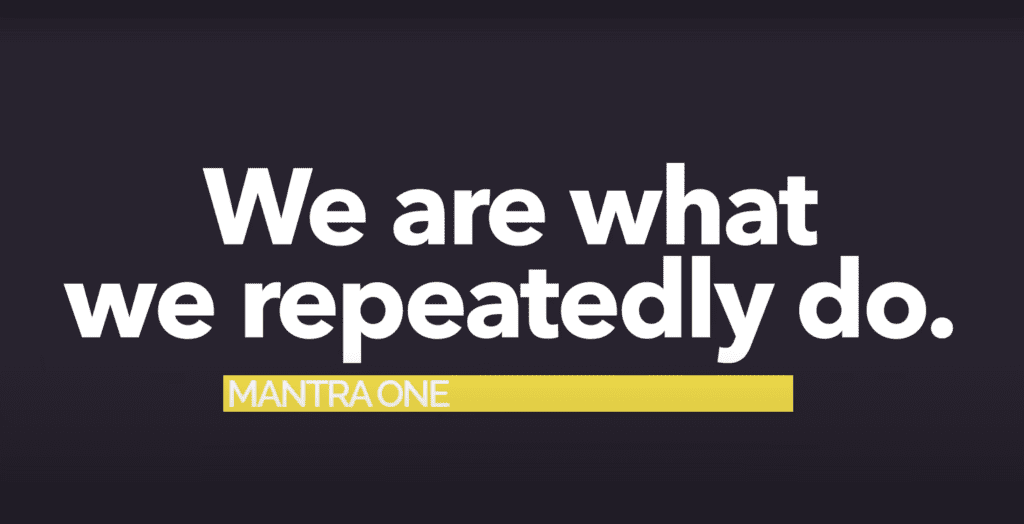
If I haven’t already preached it enough in this video, the key to becoming organized all comes down to your daily habits. Learning to be more organized is going to require adopting little habits and routines you follow every day. Becoming organized is going to come down to little tiny actions you do every day. Sometimes that’s why it’s so hard, because these little tiny actions are easy to pass up. To say, “eh it’s just ONE load of laundry” or “I can skip the dishes for ONE night” or “it’s only a little mess, I’ll clean it up when I get home.” But, it really comes down to being disciplined about these little tasks. Understanding even the smallest tasks are important, and thus skipping them is important, too. Because it all ripples. If you don’t do the dishes tonight, it becomes tomorrow’s problem. Tomorrow you’re going to lose 15 minutes in the morning doing yesterday’s work and now you’re starting the day behind. If you let a mess pile up on your desk, it is going to take you 30 minutes to sort it all. As opposed to decluttering your desk each day before work, which would only take you 2-3 minutes. When you don’t want to do something, remind yourself: the only difference between the person you are now and who you want to be is your daily habits. Give importance to the little tasks. Plus, the more repeatedly you do them, the more habitual they become. It makes it so much easier when your body and mind default to doing it, rather than having to constantly force yourself to do it.
Mantra Two: Simplify Your Stuff.

Here’s the thing, almost all of us have too much stuff. I make videos about organizing and decluttering FOR A LIVING, and even I have too much stuff sometimes. It’s estimated that we spend 50% of our cleaning time just tending to our stuff. Even worse, clutter and excess stuff is linked to everything from anxiety to depression to procrastination to poor sleep. Ultimately, having too much stuff will make it impossible to stay organized, because you’re only one person and you simply cannot be in charge of storing and managing all that stuff. Unless you want it to be your full-time job.
I’m not asking you to be a minimalist, I’m not a minimalist, but really start to focus on simplifying. Letting go of things that aren’t serving you, things that take more time to manage and inventory than they provide in value. Free yourself from having to care for all this STUFF. In doing so, you’re going to make your job of staying organized 100x easier. For the next 30 days, set a timer for 10 minutes each day and declutter one thing. If you don’t finish, it’s ok; just do what you can in those 10 minutes. This can be a junk drawer, that pile of paper on the counter, your t-shirt drawer, a shelf in the playroom, your purse, the spice rack, the freezer, or the pile of things that accumulated on the stairs to “go upstairs” but never made it. Just pick ONE thing, nothing monumental. But pick one and declutter it. Get rid of what doesn’t belong, and put the rest where it belongs. Just 10 minutes, we can all find 10 minutes somewhere. If it’s going well, get crazy and do it 2x a day. The point here is really to make sure you’re doing it every day even if it’s something small that doesn’t feel important. Because what it does is wire your brain to start decluttering habitually. Your brain will start to automatically clear and declutter areas.
Mantra Three: Control the flow.

Definitely, one of the biggest issues when it comes to our clutter is that things are always coming into our house. I always talk about how we have many means by which things enter our home regularly: our kids’ schools, mail, packages, shopping trips, guests, family stopping by, hand-me-downs, etc. But, we typically only have one or two methods in which things are leaving REGULARLY. So, we need to intentionally make a few more of these so the amount coming in equals the amount going out. We’re looking for balance. A few personal examples for me: I empty and break down all boxes from packages almost immediately upon getting them. Products purchased go where they belong and boxes go into the trunk. When the trunk starts to fill, I swing by the dump to recycle it. Another example would be when we get mail, I open, sort, and tend to it as immediately as possible. When my kids get a new toy, we very typically find one that’s no longer being used to donate. When I replace my makeup with some new things, I clear out the old stuff. It’s essentially the idea of ‘one in, one out.’ Just really be conscious about trying to match the flow coming in with the flow going out. Think about the spots that are the biggest roadblocks for you, whether it’s boxes, paperwork, clothing, etc., and then develop a system to control that flow and stick with it. Like with my boxes, I put them in my trunk because I need that space, so it forces me to not skip it. I don’t pile boxes in the garage because then I’d definitely ignore them. I can’t do that when they’re in my trunk because I need that space.
Mantra Four: Remove excess packaging.

One of the best things I’ve started doing in the past few years to further assist with my organization is decanting. Essentially it’s just getting rid of all excess packaging that I don’t need. EVERYTHING comes in a package and typically, we keep things in the packaging they came in simply because it seems to make the most sense and be the most convenient. However, I’ve really found it’s actually not. It tends to be bulky, less conducive to keeping things tidy and often makes it harder for me to know when I need to reorder something. Certainly, when most of us think of decanting we think of pantries since it’s what we see on social media the most, but really this can apply to many aspects of your life. One place I’ve found decanting to be the most beneficial is with kid stuff. Kids’ toys, for example, are far easier to maintain, store, and manage when I take them OUT of the boxes they came in and store them in bins. These kinds of bins are cohesive, meaning the same general shape/size so they can easily stack and store together. They are easier to access for parents and kids than the cardboard boxes most things come in. Unlike cardboard boxes, they don’t break and fall apart and rip open. It makes it easier to see what’s inside and easier to store. I really try to remove as much packaging as I can, from taking batteries out of their packaging to taking diapers out of bags and boxes to removing packaging from food and snacks.
Mantra Five: Give everything a home.

The things that continually clutter up my home are the things that don’t have homes. Because things that have homes are easier to put away. They don’t take time/effort because you just return them to the spot they go. The stuff that doesn’t have a home, lingers. And we all have those spots, where these lingering items accumulate, they get together and like hang out, loiter, and cause trouble. If something is loitering it’s because it doesn’t have a home or the home you gave it isn’t working out. Give homes to things, and if the home isn’t working out, find a new home. I’m constantly reworking little organizational structures in my house to accommodate new and rotating items. Always be actively thinking about what home you can assign to items to prevent them from sitting around. Like I tell my 4-year-old, we put our things back where they go so we know where they are next time we’re trying to find them.
These 5 mantras when followed for 30 days really can make you an organized person. So to recap, for 30 days I want you to:
- Remember, you are what you repeatedly do. Skipping days is non-negotiable, especially for the first 30 days. If you want to be more organized you have to do it every day.
- Simplify your stuff. Set and 10-minute timer once a day and declutter SOMETHING.
- Control the flow: Match the flow of things coming out with things coming in. If it helps, keep a log for a week or two, on a sheet of paper just jot down all the things that enter your home. Do you have an equivalent amount going out?
- Remove excess packaging. Try to identify areas where excess packaging isn’t supporting your organizational structure. Find ways to remove packaging where you can to simplify and streamline.
- Give everything a home. Find the spots where items are loitering and which items are accumulating. Why are they accumulating? Is their current home not working out or do you not have a spot they belong?
